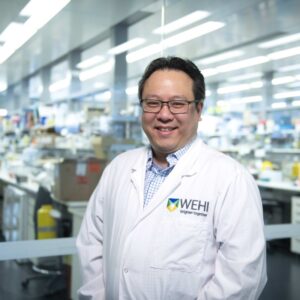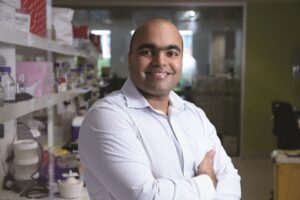Best and brightest researchers taking on leukaemia
Blood cancer research is our best chance of developing better ways of treating and caring for Australians with blood cancer.
New Breakthrough Fellowships making research history
Excitingly, we’ve just made one of our most significant investments into blood cancer research ever with the launch of our prestigious Breakthrough Fellowship program.
The new Fellowships, supported by Tour de Cure, are the flagship of our National Research Program.
Importantly, these Fellowships are propelling the next generation of Australia’s brightest researchers and clinicians to undertake cutting-edge research right here in Australia.
Investing in the best of the best
Our two Breakthrough Fellowship recipients are outstanding researchers who’ve made significant contributions to how we treat and care for people with blood cancer.
They are each receiving a $1 million grant over five years, allowing them to lead and shape blood cancer research in the future.
Here’s a summary of the promising research being undertaken by our inaugural Fellowship recipients, Dr Ashley Ng and Dr Ashwin Unnikrishnan.
Dr Ashley Ng hopes to change the future of blood cancer care by improving our understanding of how blood cancer resists current medicines.

Dr Ng is a distinguished clinical haematologist at the Royal Melbourne Hospital and Peter MacCallum Cancer Centre, and a haematopathologist and clinician researcher at WEHI.
Uncovering the secrets behind leukaemia treatment resistance
Acute lymphoblastic leukaemia (ALL) is a type of blood cancer that causes the body to produce dangerous numbers of immature white blood cells.
Each year, around 400 Australians are diagnosed with ALL and effective treatments are incredibly important to save more lives.
A type of ALL, called Philadelphia chromosome-positive B-cell ALL (Ph+ B-ALL), currently has very low survival rates and we urgently need new approaches to its treatment.
Dr Ng is leading advanced research to improve our understanding of treatment-resistant ALL and develop new ways of beating it.
He believes that “breakthroughs in acute leukaemia therapy require innovative approaches” and it’s this mindset that’s set the scene for his research.
Dr Ng’s project aims to:
- Increase the understanding of changes that occur to cancerous ALL cells.
- Use cutting-edge methods to understand what molecular factors lead to changes that cause the disease to be resistant to current standard treatment or lead someone to relapse.
- Develop and test new potential therapies where ALL is resistant to current standard treatments.
His research represents new hope and treatment options, particularly for young Australians diagnosed with high-risk ALL who don’t respond well to standard treatment.
You can read more about Dr Ng’s exciting research here.
Dr Ashwin Unnikrishnan’s research is focused on finding new treatments that could be more effective at killing leukaemia cells with fewer side effects.

Dr Unnikrishnan is a renowned cancer researcher with a track record of impactful translational biology research in blood cancers.
Replacing chemotherapy with targeted treatment
Acute myeloid leukaemia (AML) is a type of blood cancer that affects the blood and bone marrow. Around 1,300 Australians are diagnosed with AML each year and it’s one of the most challenging blood cancers to treat.
Dr Unnikrishnan hopes to provide new treatment options for people with AML where standard treatment is not effective.
“The standard treatment for AML is chemotherapy, a blunt-edged tool that kills cells indiscriminately whilst being ineffective at eliminating leukaemic cells from the body,” explains Dr Unnikrishnan.
“Our proposal aims to improve this, by discovering more specific and effective ways to kill leukaemic cells.”
His research aims to develop better treatments by targeting RNA slicing, a molecular pathway that Dr Unnikrishnan’s lab has discovered is frequently altered in people with AML.
Simply put, these new treatment options will be able to target leukaemic cells specifically.
“These treatments could be more effective and with fewer side effects, as healthy cells would be spared,” says Dr Unnikrishnan.
You can read more about Dr Unnikrishnan’s important research here.
We’re incredibly excited to support Dr Ng and Dr Unnikrishnan as bold leaders in blood cancer research. Their innovative research will help deliver better outcomes for people living with blood cancer and ultimately save more lives.
